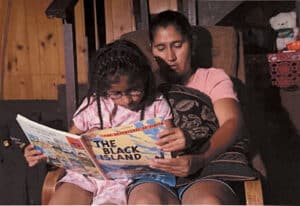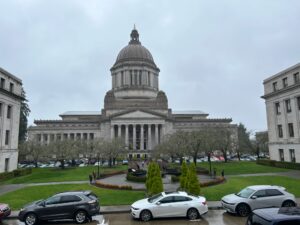 A rainy and stormy opening day to the 2024 legislative session
A rainy and stormy opening day to the 2024 legislative session
(Photo Credit: Erica Hallock)
Trivia!
What is the significance of these numbers to Washington’s 2024 legislative session?
60
599
18
6
71
200
311
And We’re Off!
The 2024 legislative session got off to a rainy start Jan. 8 with lawmakers, staff and lobbyists alike donning purple attire to show their support for the University of Washington Huskies representing the Pac 12 in the National Championship Game. RIP Pac 12. There goes my childhood dream.
In a short session with big needs, grand ambitions and minimal time, lawmakers quickly got down to business with the House passing bills on the first day. The campus truly was an example of “zero to 60” with a flurry of fiscal and policy committee hearings throughout the first week. There was no easing back in gently!
The big news causing chatter on the Capitol campus was the new cafeteria in the Legislative Building. I’m sure I’m not alone in grieving the loss of the Dome Deli. I will particularly miss the sandwiches of the “D.D.,” named after notable legislators as well as the friendly faces who worked there for years. There is still food, but it is primarily via vending machines and pre-made, so it is not a bad idea to pack a lunch if you are coming for the day! No more Helen Sommers sandwich with chips …
What’s the Tea?
In the lead up to the start of legislative activity, we heard a lot from the Governor as well as Democratic and Republican leadership via the traditional Associated Press Forum, the Governor’s State of the State (including the Republican response), the House of Representative’s Opening Ceremonies where both the Speaker and Minority Leader outlined their priorities as well as Democratic and Republican leadership media availabilities.
In what was his final State of the State, Governor Jay Inslee opened by stating this is not his farewell speech and, as the son of a high school track coach, he was always taught to “run through the tape.” In other words, he intends to finish strong. At the start of his remarks, the Governor referenced the support of the First Spouse, Trudi, and talked about how he loves seeing the campus child care center she inspired to serve Capitol families.
The Governor looked back at how the state has grown (literally, by its population) and evolved with its policies. And he acknowledged the challenges we continue to face, particularly in climate and housing.
Throughout all of these speeches and media availabilities, it was clear the leadership of both parties see similar needs. Democrats and Republicans alike in both chambers spoke to pressing needs in housing (including rising rents), child care affordability and access, behavioral health, public safety, and the pressing needs of Washington’s workforce.
At the Associated Press forum prior to the start of the legislative session, a poll conducted by Elway and Crosscut was shared that found the public’s top priorities include: 1) economic issues, including cost of living and inflation; 2) public safety and homelessness; 3) taxes; 4) government; and 5) environment. The poll also found the public supports more investment in services but would like to see reduced taxes.
While Democrats and Republicans identify the same challenges and both parties acknowledge that challenges and solutions do not exist in siloes, the Democrats and Republicans clearly have different approaches. At the Republican leadership media availability this week, one reporter jokingly teased Republican leaders about their “pessimistic attitude.”
These varying approaches are apparent in the policy bills introduced as well as in the lines of questioning in policy committees during this first week of the legislative session. In child care, for example, there is a school of thought that child care has become less affordable and expensive due to over-regulation and there has been legislation introduced to exempt some family child care homes from licensing requirements and/or to change educational requirements for providers.
This dialogue, of course, is all part of the democratic process and we will see how it evolves in the next 55 days!
Highlights of the Week
As noted above, policy committees got off to a fast start this week. Tuesday’s inaugural meeting of the House Human Services, Youth and Early Learning Committee focused exclusively on early learning related legislation, including:
- House Bill 2101 by Representative Rule would prohibit the Department of Children, Youth, and Families (DCYF) from charging child care licensing fees. During the pandemic, child care licensing fees were temporarily suspended. This bill would make this permanent. Proponents spoke about the financial challenges faced by child care providers and how these licensing fees could be reinvested into serving the needs of their students.
- House Bill 2111 by new Representative Nance is a technical bill that would reorganize the Working Connections Child Care (WCCC) statute to reflect changes made through the Fair Start for Kids Act to increase access and affordability. Supporters of HB 2111 testified that the reorganizational nature of the bill will make eligibility for Working Connections clearer for parents and caregivers. In addition, the bill is a culmination of concrete steps the state has taken to address the (lack of) affordable child care and increases access for populations such as low-income students.
- House Bill 2124 by Representative Eslick would change Working Connections Child Care work requirements to include family participation in ECEAP, Early ECEAP, Head Start and Early Head Start. It would also make inflationary adjustments to dual language and subsidy rate enhancements established in Fair Start for Kids Act a requirement, rather than subject to appropriation. Finally, it would allow employees of ECEAP or Early ECEAP to be eligible for Working Connections Child Care if their household income is below 85% of the state median income. Proponents, including families who have participated in ECEAP, spoke to the positive impact the program has had for their families.
- House Bill 1945 by Representative Alvarado would make children that are eligible for federal or state Basic Food benefits categorically eligible for ECEAP and Early ECEAP. It would also simplify income eligibility requirements for Working Connections Child Care by providing that eligibility for federal or state Basic Food benefits satisfies WCCC income requirements. Proponents of the bill testified to the importance of coordination between programs and not placing undue burden on families by making multiple requests for information already provided and available.
All of these bills aside from HB 1945 are scheduled for Executive Session (i.e. a vote) Friday, Jan. 12 at 8 a.m. We will report on the outcomes – and any amendments adopted – in next week’s update.
On Thursday, Jan. 11, the Senate Early Learning Committee heard Senate Bill 5774 which would require DCYF to maintain the ability to roll, print, or scan fingerprints in its early learning and child welfare offices, thereby increasing the capacity for conducting fingerprint-based background checks for prospective employees in child care and other programs. Sponsored by Senator Claire Wilson and Senate Majority Leader Andy Billig, this bill is a response to the challenges prospective providers face in finding locations to conduct fingerprint background checks. This can be particularly difficult in more rural and remote areas where significant travel or limited availability for openings can make securing the fingerprints a problem.
What’s on Deck for Next Week?
I joke that during the legislative session, an hour is like a day, a day like a week and, well, you get the idea. Each Wednesday night, the Senate and House release their proposed hearing schedules for the following week. This helps advocates plan and arrange testimony and sign-ins. Often, these schedules change as bills are added and removed from the calendars, but it is a helpful organizing tool.
As it stands now, key early learning related bills scheduled for hearing next week include:
- SB 6109 (Wilson, C. and Boehnke) will be heard in the Senate Human Services Committee Thursday, Jan. 18. This bill relates to child welfare in that it would change the removal standard for out-of-home placement for children due to the use or possession of a high potency synthetic opioid. But it also includes a number of supports for families experiencing substance use disorder including up to 150 targeted, voluntary home visiting slots (similar to the proposal contained in Governor Inslee’s proposed budget).
- HB 2195 (Callan and Eslick) will be heard in the House Capital Budget Committee Thursday, Jan. 18. This bill would make changes to the Ruth LeCocq Kagi early learning facilities development account (ELF). Most significantly, it would allocate any capital gains tax revenue after the first $500 million into the Education Legacy Trust Account, with 25% to the ELF account and 75% to the Common School Construction Fund, effective July 1, 2024. It would also remove the ELF award limits effective July 1, 2025; add translation services as an eligible administrative cost; prioritize applications for ELF construction, renovation, purchase, or repair grants to facilities that are ready for construction; and codify language allowing ELF facilities collocated with housing developments to receive state funding for 90% of the project cost, regardless of the match amount.
- HB 2243 (Reeves and Waters) will be heard in the House Agriculture and Natural Resources Committee Friday, Jan. 19. (This is – I think – the first committee referral for an early learning bill!). This bill would create the Children’s Social Equity Land Trust wherein funding for child care deserts would be generated by revenue from working forests statewide.
Finally, the Thursday, Jan. 18 meeting of the Senate Early Learning & K-12 Committee will focus on Early Learning legislation with hearings on bills relating to streamlining early learning program eligibility (SB 5870); technical cleanup of Working Connections Child Care statutes (SB 5941); and designation of early learning coordinators at educational service districts (SB 6018).
Bill Tracker
Start Early Washington produces a more comprehensive list of introduced legislation available on our resource page via our bill tracker. It is updated each Thursday to include the next week’s committee schedules. The status of bills can change quickly, though, so it is always a good idea to check the latest status on the legislative webpage.

 The Legislative Building showing off its winter festive self with the Holiday Tree display. The trees hold 7,000 lights with the theme of “video games.”
The Legislative Building showing off its winter festive self with the Holiday Tree display. The trees hold 7,000 lights with the theme of “video games.” (Photo Credit: Erica Hallock)
(Photo Credit: Erica Hallock) In July 2023, Pamela Williams joined a global panel discussion at the
In July 2023, Pamela Williams joined a global panel discussion at the 
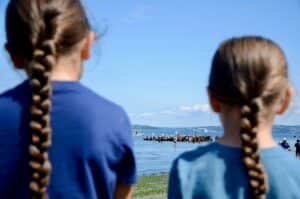


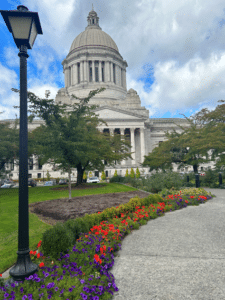 No matter the season, the Capitol Campus is always gorgeous!
No matter the season, the Capitol Campus is always gorgeous!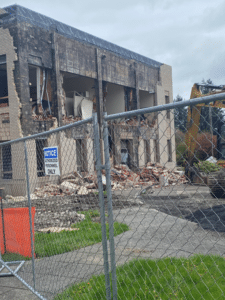 Irv Newhouse Building during the waning days of the Legislative session in April 2023
Irv Newhouse Building during the waning days of the Legislative session in April 2023 A much different view in September 2023
A much different view in September 2023 Whether it is preparing an older sibling for the arrival of a new baby or potty training a toddler, Camille Carlson recognizes that everyone – whether they are aware of it or not – uses
Whether it is preparing an older sibling for the arrival of a new baby or potty training a toddler, Camille Carlson recognizes that everyone – whether they are aware of it or not – uses  Camille uses her expertise to help home visiting programs deliver services relevant to the unique needs of the children and families they support. Her firsthand experience as a parent fuels her desire to improve systems of support for children, their families, and the teams of staff that serve them. Camille’s motivation for this work grew when she was pregnant with her second child. “During my pregnancy, I had the support of home visitors and supervisors at my fingertips. As I listened to home visiting professionals across the state discuss parent coaching and family observations, I started applying their valuable insight to navigate the changing dynamics of my life with two children. This process helped me gain confidence in my parenting skills, and it was a beautiful reminder that family is central to our work. I was overwhelmed by the support that was given to me and the confidence that it brought, which emphasized the importance of sharing such a positive experience with others.”
Camille uses her expertise to help home visiting programs deliver services relevant to the unique needs of the children and families they support. Her firsthand experience as a parent fuels her desire to improve systems of support for children, their families, and the teams of staff that serve them. Camille’s motivation for this work grew when she was pregnant with her second child. “During my pregnancy, I had the support of home visitors and supervisors at my fingertips. As I listened to home visiting professionals across the state discuss parent coaching and family observations, I started applying their valuable insight to navigate the changing dynamics of my life with two children. This process helped me gain confidence in my parenting skills, and it was a beautiful reminder that family is central to our work. I was overwhelmed by the support that was given to me and the confidence that it brought, which emphasized the importance of sharing such a positive experience with others.” Quality improvement is essential to providing successful home visiting services where staff collaboratively establish goals, reflect and create actionable steps for improvement. By adhering to a CQI process, home visiting programs can build strong relationships with families, make well-planned decisions and increase positive outcomes to achieve better support for children and families.
Quality improvement is essential to providing successful home visiting services where staff collaboratively establish goals, reflect and create actionable steps for improvement. By adhering to a CQI process, home visiting programs can build strong relationships with families, make well-planned decisions and increase positive outcomes to achieve better support for children and families. Olympia prepares for
Olympia prepares for 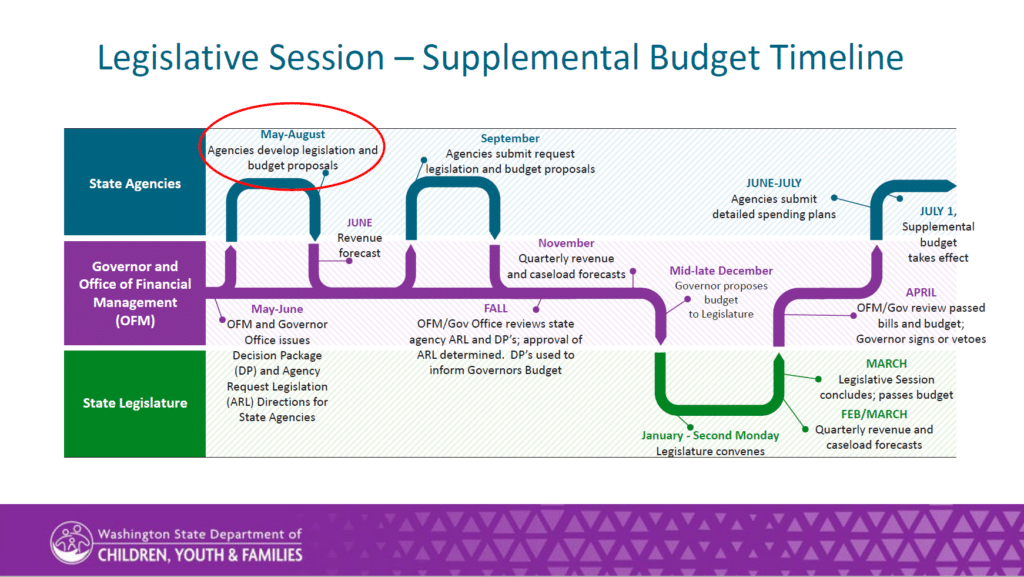

 The Capitol Campus is just showing off …
The Capitol Campus is just showing off … The year of this photo is unknown, but my educated guess is the late 1960s- early 1970s based on the snazzy fashion choices.
The year of this photo is unknown, but my educated guess is the late 1960s- early 1970s based on the snazzy fashion choices. Newhouse Building construction as of May 4, 2023
Newhouse Building construction as of May 4, 2023 As the program analyst for
As the program analyst for 